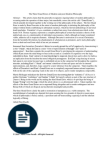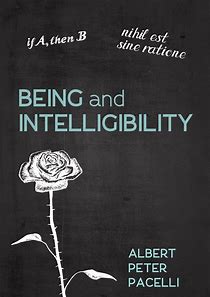Papers
 "On The World Beyond (A Summary of Transcendent Realism)" summarizes the philosophy first presented in Being and Intelligibility and includes some clarifications and new ideas. Transcendent realism is a theistic philosophical system which holds that reality comprises physical and metaphysical entities, including morally conscious souls and God, as the creative and sustaining explanation of the being of beings ("Being") and moral obligation. The three central theses of the philosophy are that (1) Being and the intelligibility of Being are self-same, reducible to logic, and logically necessary, (2) absolute nothingness is incoherent because it entails the absence of the rules of its own conception, and (3) human rational experience is not materially reducible and includes direct and inferential experience of metaphysical Being. Some of the ideas developed in this summary are: (A) that the presuppositions of objective reason include a self-transcendent, knowing soul and the logicality of Being; (B) humankind is a self-concerned, substantive, psychosomatic unity whose Being is being-toward-God, whose soul exists not in, but alongside, the external world, and whose body is the physical manifestation of the soul's relation to the external world; (C) the logicality of Being implies the existence of the one and only God as its Supreme Principle and as Agape (unqualified good will), the definitionally good, self-intending source of the moral obligation of self-transcending souls; and (D) humankind's fundamental obligation, as the agent of God's self-intending good will and the being who brings morality into the world, is to act with agape to all. The article is available for downloading by clicking on the "Download" button below.
"On The World Beyond (A Summary of Transcendent Realism)" summarizes the philosophy first presented in Being and Intelligibility and includes some clarifications and new ideas. Transcendent realism is a theistic philosophical system which holds that reality comprises physical and metaphysical entities, including morally conscious souls and God, as the creative and sustaining explanation of the being of beings ("Being") and moral obligation. The three central theses of the philosophy are that (1) Being and the intelligibility of Being are self-same, reducible to logic, and logically necessary, (2) absolute nothingness is incoherent because it entails the absence of the rules of its own conception, and (3) human rational experience is not materially reducible and includes direct and inferential experience of metaphysical Being. Some of the ideas developed in this summary are: (A) that the presuppositions of objective reason include a self-transcendent, knowing soul and the logicality of Being; (B) humankind is a self-concerned, substantive, psychosomatic unity whose Being is being-toward-God, whose soul exists not in, but alongside, the external world, and whose body is the physical manifestation of the soul's relation to the external world; (C) the logicality of Being implies the existence of the one and only God as its Supreme Principle and as Agape (unqualified good will), the definitionally good, self-intending source of the moral obligation of self-transcending souls; and (D) humankind's fundamental obligation, as the agent of God's self-intending good will and the being who brings morality into the world, is to act with agape to all. The article is available for downloading by clicking on the "Download" button below.
 "The Three Grand Errors of Modern (and Post Modern Philosophy)" claims that the generally-recognized, ongoing failure of modern philosophy is occurring under the operation of three major, but remediable, errors (the article calls "Grand Errors"), which naturally developed together in the working out of the philosophy of the subject and further that the reestablishment of metaphysics depends first upon securing the two grounds of objective reason upon which all philosophy is based, namely, a persistent and self-transcending cognizing-I and the inherent logicality of the being of beings. The article is available for downloading by clicking on the "Download" button below.
"The Three Grand Errors of Modern (and Post Modern Philosophy)" claims that the generally-recognized, ongoing failure of modern philosophy is occurring under the operation of three major, but remediable, errors (the article calls "Grand Errors"), which naturally developed together in the working out of the philosophy of the subject and further that the reestablishment of metaphysics depends first upon securing the two grounds of objective reason upon which all philosophy is based, namely, a persistent and self-transcending cognizing-I and the inherent logicality of the being of beings. The article is available for downloading by clicking on the "Download" button below.
Books
 Being and Intelligibility is a philosophical treatise on the meaning of being in its two senses. The book explores the most originary ontological question, namely, “what do we mean when we say that something is?”, and also the most originary existential question, namely, “what is the meaning of human experience?”, in each case, by reference to a fundamental principle of being and intelligibility, which, following the pre-Socratics, is called the Logos. The book argues that all rational experience is of objects which are at root a unity (ground) of relations (predicates) which include sequence, magnitude, and proportionality. The central thesis of Being and Intelligibility is that the beingness of beings (“Being”) and intelligibility are strictly self-same and that, because nothingness (i.e., absolute not-Being) entails the absence of the rules of its own conception, it is self-contradictory and unintelligible, with the result that Being is logically necessary. Select chapters are avialbe for download by clicking on the button below.
Being and Intelligibility is a philosophical treatise on the meaning of being in its two senses. The book explores the most originary ontological question, namely, “what do we mean when we say that something is?”, and also the most originary existential question, namely, “what is the meaning of human experience?”, in each case, by reference to a fundamental principle of being and intelligibility, which, following the pre-Socratics, is called the Logos. The book argues that all rational experience is of objects which are at root a unity (ground) of relations (predicates) which include sequence, magnitude, and proportionality. The central thesis of Being and Intelligibility is that the beingness of beings (“Being”) and intelligibility are strictly self-same and that, because nothingness (i.e., absolute not-Being) entails the absence of the rules of its own conception, it is self-contradictory and unintelligible, with the result that Being is logically necessary. Select chapters are avialbe for download by clicking on the button below.